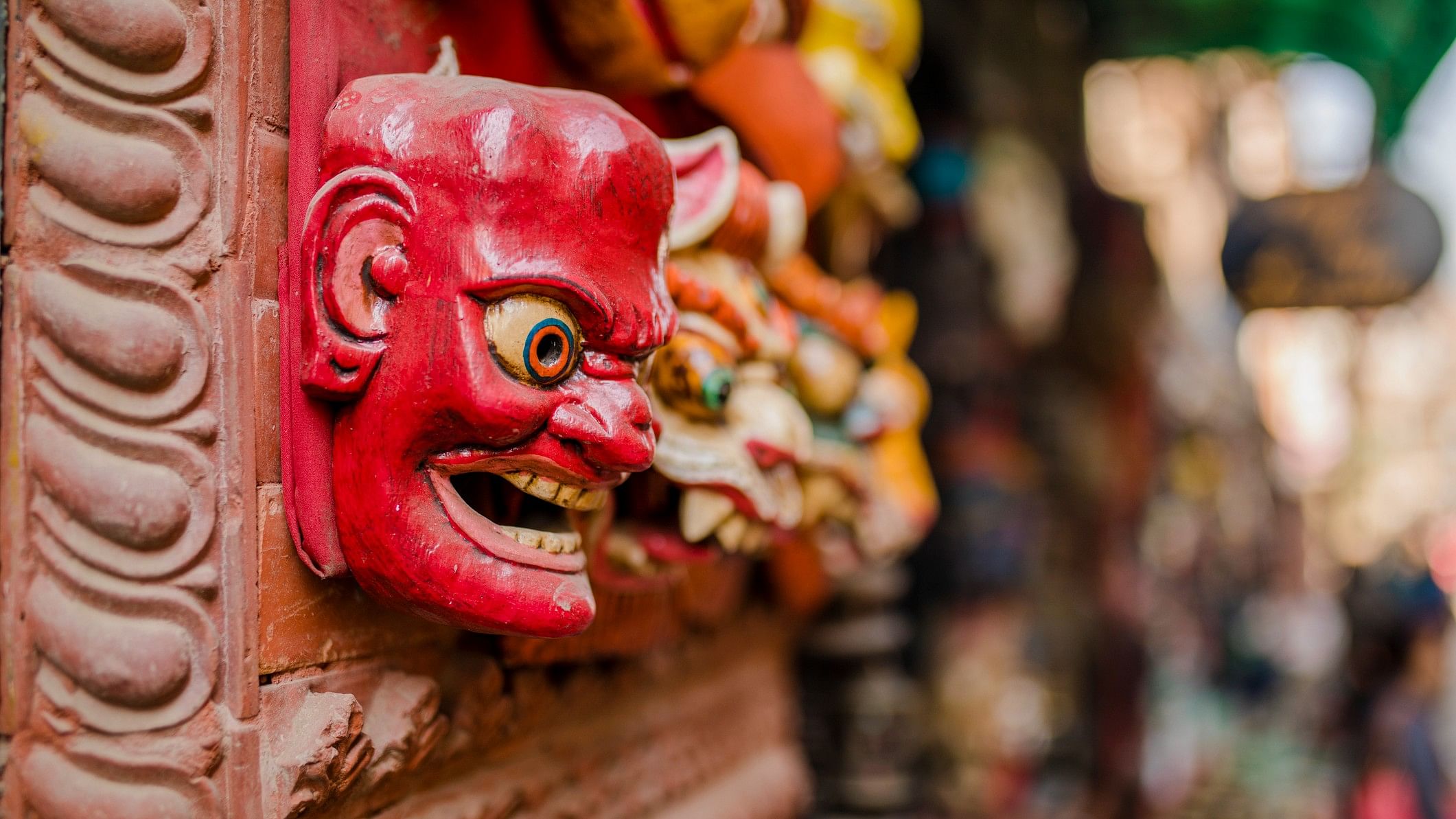
Representative image showing masks which are often a part of myth formation in different societies.
Credit: iStock Photo
The historian unearths facts. They will tell you that the images related to the Ramayana, the Mahabharata, and Shiva’s marriage, started appearing in stone carvings less than 2,000 years ago. This is boring.
By contrast, mytho-fiction writers are not constrained by facts. They can say that Shiva Purana describes historical events that occurred at the end of the last Ice Age, 10,000 years ago, followed by events of the Ramayana 7,000 years ago, and then the Mahabharata 5,000 years ago. Such fantasies are far more popular among the public. They fuel pride. The politician will, therefore, always side with the mytho-fiction writer rather than the historian.
But what about mythology? It is neither history nor mytho-fiction. While people differentiate science from science fiction, and history from historical fiction, few can differentiate between mythology and mythological fiction. The two are often assumed to be the same. But they are not:
Mytho-fiction is designed to make you feel good about the past, indifferent to evidence.
History tells you, based on evidence, what the past was.
Mythology tells you, based on evidence, how people in the past imagined their world.
Myth is somebody’s truth
Animals do not have a mythology as they know who they are: they are predators to their prey, and prey to their predators. Humans do not have that knowledge. As humans, we do not know who are our allies, and who are our rivals. So, we create stories that bind us to collaborators, and isolate us from hostile forces. These stories are myths — elaborated and repeated through symbols and rituals.
Every tribe has its own myth — its own stories about how the world came into being, how the world will end, why we exist, and what happens after death. These ideas are transmitted using stories, symbols, and rituals. They are real for the insider; not the outsider.
Pre-Vedic Indians buried the dead in pots, or placed giant stones on burial spots. Why? They had a story — to which we have no access. But that story determined how they lived their life, and how they buried their dead. It was their myth. Very different from the myths of Vedic Indians that made them cremate the dead, and throw the ash in the river, and feed ancestors during the monsoon season. Different myths create different customs which create different cultures. A mythologist studies this, while a mytho-fiction writer might have no interest in it.
Atheist myths
Hindu, Buddhist, and Jain stories that originated in India inform us how life is shaped by various forces, and how humans carry forward issues and problems into the next life. By contrast, the Bible and the Quran, which originated in the Middle East, insist humans live only one life, and so everything has to be resolved on earth or on Judgement Day.
Middle Eastern myths are based on the idea of one life, and one way of living life. Indian myths speak of rebirth and multiple possibilities. The two are as different as oil and water, and they influence how these cultures respond to various historical events. The monotheistic myth shapes the reality of Israel-Palestine.
Atheists will argue otherwise because they feel myths belong to religious folk, and they are rational beings who do not believe in supernatural forces. But myths are not just about gods — they are about man-made concepts that we have faith in. Property is a myth, for example. Not natural, not real, but a totally made-up concept. So is human rights. Equality and justice are also cultural truths that presuppose the myths of property and human rights. Their existence is enforced through force and regulatory authorities. They do not exist outside the human imagination.
Real impact of cultural imaginations
Myth, unlike facts, is neither objective nor universal. It belongs to a group of people, a community, a culture. Hence all humans will never agree on ideas such as property, human rights, justice, and equality. Muslim communities argue that God tells them to be homophobic, and how men and women are supposed to live their lives. How does one argue with that?
Many tribes believe you can only own cattle, not land. Such tribes would be at odds with nation-states that are based on geographical boundaries. Today we say Amazon forests ‘belong’ to Brazil. No one checked with the Amazon tribes who lived in those forests for thousands of years and never claimed to own them. Tribal communities around the world feel they are being bullied into submission by ‘myths of the nation-state’ but who do they appeal to? Their gods do not listen. The rational lawyers of the nation-state serve the interests of the nation-state, not the tribe.
Wisdom is recognising that everyone has their own truth. Different truths create different cultures. Often truths are at odds with each other. This is the source of conflict. Rationality will not resolve this. If we believe violence is justified, then peace has no chance.
(Devdutt Pattanaik is the author of more than 50 books on mythology. X: @devduttmyth.)
Disclaimer: The views expressed above are the author's own. They do not necessarily reflect the views of DH.